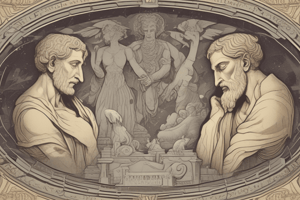Podcast
Questions and Answers
Who is often referred to as the 'Father of History'?
Who is often referred to as the 'Father of History'?
- Plato
- Herodotus (correct)
- Socrates
- Protagoras
Which Greek philosopher was a student of Socrates and teacher of Aristotle?
Which Greek philosopher was a student of Socrates and teacher of Aristotle?
- Herodotus
- Hermes
- Protagoras
- Plato (correct)
Who is associated with communication, commerce, and travel in Greek religion?
Who is associated with communication, commerce, and travel in Greek religion?
- Zeus
- Hera
- Hermes (correct)
- Apollo
Which Greek goddess was associated with marriage, family, and childbirth?
Which Greek goddess was associated with marriage, family, and childbirth?
What concept inspired later democratic movements by allowing citizens to participate in decision-making?
What concept inspired later democratic movements by allowing citizens to participate in decision-making?
What purpose did the Delian League serve after its formation?
What purpose did the Delian League serve after its formation?
Which city-state was renowned for its focus on military training and discipline?
Which city-state was renowned for its focus on military training and discipline?
Who was responsible for the education of youth and the conduct of all citizens in Sparta?
Who was responsible for the education of youth and the conduct of all citizens in Sparta?
Which city-state is known as the birthplace of democracy and valued arts and culture highly?
Which city-state is known as the birthplace of democracy and valued arts and culture highly?
Who, through foresight in building a powerful navy, shifted the balance of power in the Aegean during the Persian Wars?
Who, through foresight in building a powerful navy, shifted the balance of power in the Aegean during the Persian Wars?
What league was formed after the Persian Wars, initially to counter Persian threats but later became a tool for Athenian dominance?
What league was formed after the Persian Wars, initially to counter Persian threats but later became a tool for Athenian dominance?
Who oversaw significant infrastructure projects in Athens during the Age of Pericles, including the Long Walls and the reconstruction of the city?
Who oversaw significant infrastructure projects in Athens during the Age of Pericles, including the Long Walls and the reconstruction of the city?
What event marked the beginning of the end of the Great Peloponnesian War?
What event marked the beginning of the end of the Great Peloponnesian War?
Which philosopher was influenced by the Great Peloponnesian War according to the text?
Which philosopher was influenced by the Great Peloponnesian War according to the text?
What did the Sicilian Expedition reveal about Athens' naval supremacy?
What did the Sicilian Expedition reveal about Athens' naval supremacy?
Who is credited as the founder of Western philosophy according to the text?
Who is credited as the founder of Western philosophy according to the text?
Where would one go to consult an oracle for advice on various matters?
Where would one go to consult an oracle for advice on various matters?
What is a tragedy according to the text?
What is a tragedy according to the text?
Flashcards are hidden until you start studying
Study Notes
Philosophers and Thinkers
- Plato was an ancient Greek philosopher, student of Socrates, teacher of Aristotle, and founder of the Academy.
- Socrates is credited as the founder of Western philosophy and among the first moral philosophers of ethics.
- Aristotle was an Ancient Greek philosopher and polymath, covering a broad range of subjects in his writings.
- Protagoras, a prominent Sophist, asserted that "Man is the measure of all things," emphasizing subjectivity and individual perspective.
Greek Gods and Mythology
- Hermes was associated with communication, commerce, and travel in Greek religion.
- Apollo was associated with the sun, music, poetry, prophecy, and healing.
- Hera was associated with marriage, family, and childbirth.
- Zeus was the ruler of Mount Olympus and considered the god of the sky.
Greek History and Politics
- The concept of democracy, developed in ancient Greece, inspired later democratic movements by allowing citizens to participate in decision-making.
- The Delian League was formed to counter Persian threats and became a tool for Athenian dominance.
- Oligarchy means “the rule of the few,” while democracy means “the rule of the many.”
- Helot is a captive person who was forced to work for the conqueror.
- An ephor is one of the five men elected each year in Sparta who was responsible for the education of youth and the conduct of all citizens.
Culture and Architecture
- The Parthenon's architecture and sculptures were laden with political and cultural symbolism, reflecting the ideals of democracy in Athens.
- The Oracle at Delphi was consulted for a wide range of matters, including political, military, and personal decisions.
- A tragedy is a form of drama that portrays a conflict between the protagonist and a superior force.
- Philosophy is an organized system of thought.
Wars and Battles
- The Battle of Aegospotami marked the beginning of the end of the Great Peloponnesian War, with a decisive Spartan victory.
- The Great Peloponnesian War had a significant impact on Athenian thought and literature, influencing works of philosophers like Plato and Xenophon.
- The Sicilian Expedition revealed the dangers of overreach, showcasing the limitations of Athens' naval supremacy.
- Themistocles' foresight in building a powerful navy shifted the balance of power in the Aegean during the Persian Wars.
City-States and Infrastructure
- Sparta was renowned for its focus on military training and discipline, shaping the city-state's societal values.
- Athens is known as the birthplace of democracy and placed a high value on arts and culture.
- Pericles, a prominent Athenian statesman, oversaw significant infrastructure projects during the Age of Pericles, including the Long Walls and the reconstruction of Athens.
Studying That Suits You
Use AI to generate personalized quizzes and flashcards to suit your learning preferences.




